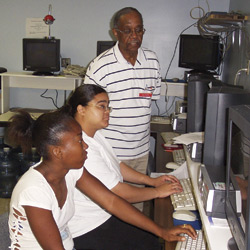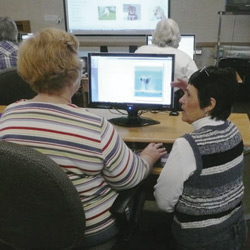Seniors Keep Up and Give Back

Getting older should not be equated with disappearing. Many retired individuals look for ways to stay active, whether just to alleviate boredom or to stay mentally and physically sharp. Some find this stage in life to be the optimal time to get involved in the community, as they have the time to learn new skills and follow them through.
Keeping Up With the Times
Staying active often means learning new things, like how to use a computer or the Internet—skills that are becoming second-nature and the preferred method of communication for younger generations. Ron Ziemba, public relations manager of Peoria Area SeniorNet, a nonprofit organization committed to teaching computer and technology skills to older adults, reported that the seniors involved in their organization simply want to be able to communicate with their grandchildren. That means learning the basics of using a computer before moving on to emails, digital photos, and possibly even Facebook!
Sponsored by the Illinois Eye Center and PNC Bank, Peoria Area SeniorNet offers classes to those who are at least 50 years old and anxious to become more technologically literate. Part of the national SeniorNet organization, the Peoria chapter was started in 1989 after Dr. Steven Sicher of the Illinois Eye Center learned of the group. Believing that it held great potential for the Peoria community, Sicher went so far as to have one of his staff members at the Eye Center coordinate the organization at first. As Peoria Area SeniorNet matured, however, a charter and bylaws were written, and it now runs itself.
One of the group’s volunteer teachers, Ziemba said about 125 students take classes in each of the spring and fall semesters. Students, who must be members of the national SeniorNet organization, can take up to two classes each semester at no charge, aside from small materials charges, which range from $2 to $5. Members also receive discounts on personal computers and software from the likes of Dell and Microsoft.
Classes meet in media labs in local churches, libraries, schools and community centers, and are taught by volunteer teachers who are assisted by coaches. The group’s Internet, email, introduction to computers and digital camera classes are most popular. “Primarily, we find the beginners want to do Internet and email, and a little bit of word processing,” said Ziemba. Classes meet for one and a half hours once a week for four to eight weeks, depending on the subject matter.
While most curriculums come from the national organization, the Peoria chapter has also developed some of its own upon request. When the Peoria Public Library eliminated its physical card catalog, SeniorNet was approached about teaching a class on how to use the computerized catalog. Frustrated with the new system, seniors had started walking out empty handed. “Libraries are becoming very, very computer-literate,” said Ziemba. “I know at Chillicothe, where I teach the class probably twice a year, the library director thinks it’s her responsibility to educate her clients on how to use a computer.” Any community organization that has such a need and access to a computer lab is encouraged to contact Peoria Area SeniorNet; if they have an instructor available, they will create a curriculum and teach a class.  Putting Experience to Work
Putting Experience to Work
While SeniorNet classes are aimed at those looking to enhance their computer skills for personal use, Experience Works offers paid training and employment experience at local government and nonprofit agencies for those seniors who are looking to increase their skill sets to enter or re-enter the workforce.
Cindy Adams had worked in retail for eight or nine years and didn’t have much experience with computers, a serious setback when looking for a job in this technology-dominated society. “I took some training—about 13 weeks with Microsoft Word, Excel and PowerPoint—and I’m using those skills now,” she said. “It has really helped me out financially, too,” she added.
Experience Works, a nonprofit organization funded by the Department of Labor, provides up to 18 hours of paid training each week at minimum wage. Participants’ skills and interests are assessed in efforts to match them with career options. They are then trained through classes and by working at host agencies, local nonprofit or government organizations willing to train older workers in skills ranging from customer service and teamwork to time management and what to wear to an interview.
Participants must be 55 or older and living at 125 percent below poverty to qualify for the program, and can only stay with it for four years. All participants are held accountable for searching for five jobs each month, and those who are involved in Experience Works’ Job Clubs, more intensive groups which feature speakers from the community and various area employers, must search for five jobs every week. There are no guarantees of finding employment after participating with the organization, said Lisa Buettner, employment and training coordinator for Experience Works in Peoria. “The only guarantee I can make is that you will learn and you will increase your potential, gain experience and put forth an effort in getting work.”
Jessie Lunini has been with Experience Works for a little over three years and is currently training at the American Red Cross. She said her supervisor there encourages her to learn as many new skills as she can, making her more marketable in the future. Since joining the Red Cross, Lunini has learned how to use Microsoft Outlook, operate the organization’s switchboard and enter volunteer hours into their database. “When you’re older, it’s a different deal than when you’re 25 or 30,” she said. “People look at you differently, even though you have all the skills and you’re very faithful and on-time and dependable.”
As part of the training, supervisors meet with participants and Buettner to go over what participants are doing well and how they can improve. This is an essential part of the process, and ensures that both participants and host agencies are getting what they need. Buettner reported that 70 percent of the people who find permanent employment through Experience Works do so with their host agencies, as employers rarely want to part with these trained and valuable workers.
Buettner works with community agencies to uncover their needs, which helps ensure that participants develop the skills needed to find permanent employment. Encouraging local companies to contact her with employment opportunities, Buettner said, “We have a lot of qualified, ready-to-go participants in our program who are just waiting for that next job opportunity.”
Staying Active Through Volunteerism
For those looking to serve the community using skills they already have, the Retired and Senior Volunteer Program (RSVP) is an excellent choice. Funded by the Corporation for National and Community Service, the Illinois Department of Aging, and the Peoria Friendship House of Christian Service, this nonprofit organization serving Peoria and Tazewell counties matches people 55 years of age and older with local groups in need of volunteers.
RSVP volunteers tutor children in reading and math, offer clerical help to local agencies, deliver blood throughout the region, escort patients at local hospitals, walk dogs at the local shelter, offer relief services to victims of natural disasters, and much more.
RSVP currently partners with 129 community organizations, so if there’s something volunteers are interested in doing in their spare time, RSVP will find a place they can do it. “We can counsel with one volunteer several times before finding the right fit,” said Ashley Kinne, RSVP’s Peoria County coordinator. “We never want a volunteer to stay at an assignment that proves [to be] non-rewarding. Volunteering is as much about receiving as it is giving,” she continued. “Both the volunteer and the agency should feel benefitted by the placement.”
From January to October of this year, 707 volunteers had served 108,022 hours in Peoria and Tazewell counties through RSVP. Sixty-seven percent of those volunteers were women, and the most active age group among them was 80 to 84. Eighty-three percent of these served four hours or less each week. “Volunteering is a part of our volunteers’ lives, but it’s not the only thing they do,” said Kinne. “They are traveling, they are taking classes, they are enjoying their grandkids.”
Karl Stach is an excellent example of an RSVP volunteer. Averaging about 20 hours of service each month, Stach delivers blood around the state for the American Red Cross, helps with membership drives and large mailings at WCBU, and does a little bit of everything at WTVP, including chairing a subcommittee for its annual auction with his wife. In addition, he volunteers at one-time events as part of RSVP’s Short-Term Assignment Retirees for Service (STARS) program. Stach said that for him and his wife, volunteering “is a way for us to get out and do something together, and we both enjoy doing it.”
Another RSVP member, Clara Eddy, has been volunteering once a week for 35 years as a member of the Friendship House Senior Club. Eddy’s story with the Senior Club began when her doctor insisted she get out of the house more often after years of caring for her ill husband. She soon found great pleasure in her volunteer work and the new friendships she had formed as a result of it. This spirited 105-year-old served as president of the Senior Club for 17 years, and currently serves as vice president, keeping track of all of their members’ volunteer hours and the group’s finances.
Both Eddy and Stach noted that volunteering not only gives them something to do, but helping others makes them feel good about themselves.
Lifelong Learning
Those looking to expand their knowledge on a broad range of subjects can find opportunities at the Osher Lifelong Learning Institute at Bradley University (OLLI). The center for continuing education currently serves 850 members ranging in age from 50 to 97. Through OLLI, members can take non-credit classes, participate in study groups, and go on learning trips both locally and regionally.
Classes offer a good amount of learning on a wide variety of subjects, but not too much participation or homework. Members choose four classes per semester, and meet all day on four consecutive Wednesdays for an all-inclusive fee.
Those looking to go more in-depth in their learning can get involved in study groups, which are more discussion-based and require more participation from members. Each group meets for a couple of hours each week for four to eight weeks, depending on the subject matter.
OLLI also offers learning trips, both locally and regionally, for those who would like to add an element of travel to their learning experiences. Trips range from exploring local businesses like Kickapoo Creek Winery and Illinois Valley Plastics to traveling throughout the region to places like the Art Institute of Chicago or Mark Twain’s Hannibal, Missouri.
OLLI’s diverse collection of programs offers members the ability to remain vital and active, and to literally be lifelong learners. iBi

